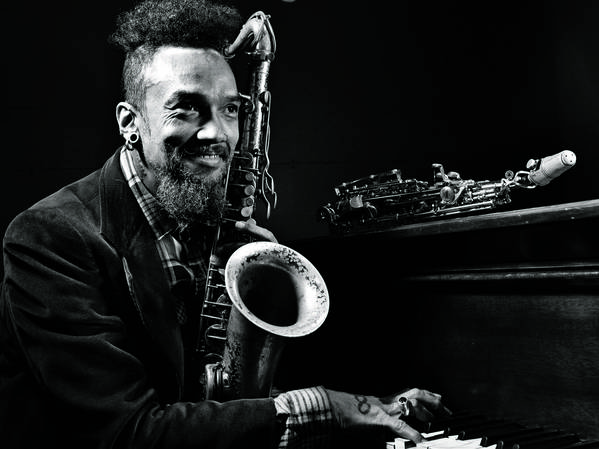Nobuhle Ashanti
Spotify announced earlier this month it will no longer pay anything to the artists making around 60% of the music currently on its platform — those drawing fewer than 1 000 streams a year.
Their original creativity may be what brings you to Spotify but every cent you pay for their streams will instead go to the big, and already rich, names at the top of the platform’s playlists. The company itself is valued at about $30 billion.
The injustice of this is obvious. But it’s also likely to have a chilling effect on creativity — if you want to earn from Spotify, you’ll need to sound like somebody who’s already successful, for example Taylor Swift, who earned $100 million in royalties from the streaming platform this year.
Meanwhile, in the backrooms, platform AI is busy cloning music that sounds like the big names, pointing to a future dominated by echo-chamber releases involving no remunerated human musicians at all and Spotify CEO Daniel Ek getting even richer. He’s worth about $2.8 billion, according to Forbes Magazine.
Around the world, musicians are finding their own ways to escape these oppressive structures. In South Africa, they’re increasingly working with nearby independent studios to self-release their work.
The resultant creative flowering is wonderful but, in a world where such enterprises have limited publicity budgets, media rarely review albums, and music scenes can be intensely local, it becomes much harder for collectors to keep up.
Especially if the collectors are in Joburg and the music’s coming out of Cape Town and Durban.
So, instead of the usual year-end replay of albums already discussed, it might be more useful to catch up on a few worthwhile contributions (these three from Cape Town) that have slipped under the 2023 reviewing radar.
The first is pianist and arranger Nobuhle Ashanti’s debut as leader, Bait for Steps Forward, which scored a win at the Mzantsi Jazz Awards back in September.
Bait for Steps Forward has the sound of young Cape Town — it draws inspiration freely from multiple genres, mixes electronics and instrumentalism, and offers self-aware lyrics dealing with relationships, identity and history.
In Ashanti’s hands, all that rests on a solid bedrock of jazz improvisation, her own fluid keyboard skills, plus three poets, five vocalists and seven empathetic instrumentalists including trumpeter Shaw Komori and what’s rapidly becoming one of the Mother City’s rhythm sections of choice, bassist Sean Sanby and drummer Kurt Bouwers.
As well as being a distinctive player, Ashanti’s range as a composer stretches wide across these dozen tracks. There’s a wry not-love song Ends in Ache, beautifully interpreted by singer Amy Campbell; a contemplative, three-number Prayer Suite; a genuinely moving ballad tribute to Dear Mom (saxophonist and teacher Ronel Nagfaal) and a club-natural piece of soulful R&B in As Is.
Ashanti’s character as an arranger speaks through layered sonic metaphors and unexpected juxtapositions.
 The Unity Band. (Daniel Rutland Manners)
The Unity Band. (Daniel Rutland Manners)
In Prayer for the Innocent, she dovetails found news clips and edgy harmonics to spotlight current discontents and the shameful treatment of fellow African migrants.
In the standout Ancestors, poetry in Afrikaans, Xhosa and English flows in and out of the music to weave a sonic tapestry of Cape history, with a perfectly judged bass solo from Sanby.
In all of this, Bait for Steps Forward is a significant album. It sends a clear message about how and where distinctive jazz idioms of the Cape — rolling piano, a fondness for song and music you can dance to, and a cosmopolitan African, Asian and seaport inheritance — are moving via the city’s young jazz voices today.
Eight-piece collective The Unity Band, helmed by drummer Lumanyano “Unity” Mzi, share that cosmopolitanism of outlook. Their compass points unwaveringly south, including to Latin America.
They share percussionist Lilavan Gangen with pianist Ashanti’s tribe, illustrating the close-knit nature of the city’s scene.
Studio outing Breaking Bread is their third album, and appeared in March, following 2019’s Fabric, and 2021’s Unity.
This might not be an outfit with the highest national profile but it is (if you check their online presence) one that works consistently — and deserves to.
Listened to in sequence, the three albums demonstrate a substantial warehouse of thoughtfully composed music. Each track is distinctive, memorably catchy and tailored so The Unity Band could put together a programme for any venue, occasion or mood. Solid professional thinking shapes a repertoire like that.
Solid is a description that keeps recurring. A stack of good tunes is worth nothing without tight playing and a collective voice conveying that the band enjoys the music as much as the audience.
The Unity Band’s playing is disciplined and empathetic — on the call-and-response of the intricate, rhythmic Chukudu, the choruses click together with joyous precision.
When solos happen, you hear inspired musicianship that’s far more than just reliable. Vocalist Thandeka Dladla (who made her own debut with Umnikelo in October) marries an appealing voice to perfect diction; whatever language she employs, the messages of the lyrics are clear.
Trumpeter Marco Maritz comes from that Miles place where edge is expressed with style and subtlety. Bassist Steven de Souza (another rhythm man of choice for players visiting Cape Town) displays the ability to both underpin a number with driving groove and step out front to carry a melody; both come together on his hip Marcus Miller tribute Millerized.
You could say similar about every one of the eight players. If Steps for Bait Forward shows where the youngsters are carrying the music, Breaking Bread shows that the Mother City’s reputation for birthing consummately professional bands that always deliver, and do it with pizazz and skill, remains untarnished.
 Mark Fransman. (Daniel Rutland Manners)
Mark Fransman. (Daniel Rutland Manners)
After all that close-knit group connectivity, the multi-instrumentalist Mark Fransman’s August release, Solo: Mark Fransman Pays Homage represents a collective in one musician. That’s not simply because Fransman plays all the instruments, but because the 10 album tracks represent the collective legacy of South African jazz.
They were inspired by musicians (and others) who, in many cases, shaped today’s sound: guitarists Errol Dyers and Allen Kwela; pianist and bandleader Chris McGregor; Robbie Jansen’s Sons of Table Mountain; reedman Mike Makhalemele and more.
The tracks, though, are no mere pastiches of earlier sounds. Rather, they represent how Fransman heard and experienced those players, many of whom he knew and worked with, and on that basis, what new music he is inspired to create.
To Homage the Sons, for example, he foregrounds the modes of Islamic music; for Kwela, a jaunty melody full of unexpected twists and shot through with a thread of sadness.
McGregor’s Journey gives us McGregor the composer, sewing ensemble arrangements from the raw cloth of repeated motifs simultaneously straightforward and intricate. Makhalemele sounds out like a rich-voiced songbird over a sunrise chorus.
The closing track is for those — musicians and others — who were Heroes of Struggle. It’s an elegy — heart-breaking in its poignancy and ending on an open question. They are no longer with us; what would they make of where we are?
Fransman well understands the idiomatic demands of each of his instruments. Though the album is shaped by a single vision, Solo isn’t an act of ventriloquism; each instrument asserts its own voice; each is treated with respect as well as skill.
The skill shouldn’t need mentioning. Fransman has longer experience than the young artists on the two albums above, with more recording credits to his name than I can count.
But even in that context, Solo is a tour de force, not only of musicianship but of memory reshaped by powerfully human imagination.
No AI could make music like this.